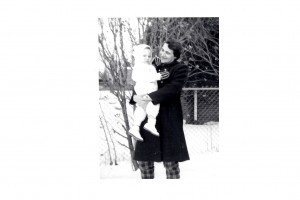Many moons ago, I had the distinct pleasure of writing a cover story about Frederick’s tight-knit Jewish community. For years, Candy and Bill Zentz, dear, longtime family friends and residents of the nearby hamlet of Thurmont, raved to me about Frederick’s small-but-vibrant community and, in particular, its unofficial spiritual leader, the charismatic Rabbi Morris Kosman of Beth Sholom Congregation.
Interviewing Rabbi Kosman — who passed away in October of 2016 on his 89th birthday — was an absolute joy. You couldn’t ask for a warmer or friendlier host, and at one point he insisted that my photographer and I join him for lunch at his downtown pied-a-terre in the “City of the Clustered Spires.” Trust me, the rabbi wasn’t someone you could turn down, and his wife, Carol, was just as cordial and gracious.
I don’t remember too much about that meal, but at one point in the conversation, Mrs. Kosman asked me all about my family — my parents, grandparents, parents-in-law, etc. When I mentioned that my mother-in-law fled Nazi Germany and came of age in a small town called Duquesne outside of Pittsburgh, Mrs. Kosman’s ears perked up.

“Is your mother-in-law’s name Ruth Bier?” she asked, to my astonishment. “Well,” I replied, “it was until she got married to my father-in-law.”
Mrs. Kosman proceeded to tell me how she vividly remembered my mother-in-law as a 14-year-old German refugee who suddenly appeared in her small shul in Duquesne. “She had beautiful, wavy hair and a fair complexion,” she recalled. “She was a couple of years older than me, but she seemed so … exotic.”
Later that night, I called my mother-in-law to tell her that this wonderful woman with an incredible memory remembered her from nearly six decades earlier. Never one to dwell much on what happened in Germany, where her family lost so much, my mother-in-law absorbed the information in a matter-of-fact manner. “Oh, that’s very nice, but I don’t remember her,” she said, and immediately changed the subject.
At first, I was a bit crestfallen she wasn’t a bit more enthusiastic. But then I thought about it. After a childhood of living through the horrors of the rise of the Third Reich and racing through Europe to desperately avoid the Nazi juggernaut, she preferred not thinking too much about coming here as a refugee who spoke little English and came off as “exotic” and different.
After all, only four years after arriving in that western Pennsylvania steel town with her dad, she went on to become valedictorian of her high school class, attended college and earned her bachelor’s and master’s degrees, and worked for a few years before meeting her husband and raising three children.
She didn’t need to look back. She knew who she was — a walking, talking example of the American Dream.
As of late, immigration has been a particularly divisive issue for Americans. While some people (including our commander-in-chief) feel measures are desperately required to curb immigration in the name of national security, others fear such tactics sacrifice our precious ideals of being a safe harbor welcoming “huddled masses yearning to breathe free.”
In this issue, we profile five notable Jewish Baltimoreans whose stories of immigration helped define their lives and contributed to the fabric of America. Like my mother-in-law, they came here for refuge and a new start. And we’re all better off for it.
Warmly,
Alan Feiler,
Editor-in-Chief





